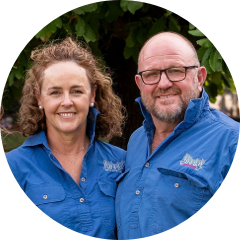Long-term trials of drought resilient farming practices in NSW
Term
2024-2027
Project Officer
Matt de Roos
WHY THIS PROJECT IS IMPORTANT
Drought is an inescapable part of the Australian landscape, and it is important farming business are well prepared for its impacts.
This project aims to investigate the inter-dependence (connectedness) and whole-of-system effects of cropping and livestock components in mixed farming systems. The project also aims to support farmers in managing the environmental and social impacts of seasonal variation and drought in NSW.
This project will use a combination of field trials and modelling to identify mixed farming systems and practices that improve drought resilience and associated risk management.
Project focus
As part of the project, a central replicated trial site has been established at Charles Sturt University’s Wagga Wagga Campus. The central hub sites consist of replicated ‘mini farms’ which represent different farming systems. Over four years, these “mini farms” will be sown to crop and pasture species according to the farm system they represent, with soil, plant and livestock measurements collected as the rotations progress. Data collected will be used to validate biophysical models that generate agronomic and economic comparisons of the systems.
Results from this central site will be complemented by data collected from six individual partner (consortium) sites across NSW. The six partner sites are each testing a single treatment from the central hub trial, using best practice guidelines for their location and preferred farming practices. Riverine Plains is delivering two of these demonstration sites in NSW, along with activities that extend findings from the central hub trial at Wagga Wagga.
For the duration of the project (2024-2027), Riverine Plains will use findings from the central hub trials, as well as input from members and advisors, to shape the paddock-scale demonstrations using practices that could benefit farmers in the Riverine Plains.
Riverine Plains is also supporting the delivery of a similar project in Victoria and Tasmania, which coordinates linked treatments across multiple sites, through which we are establishing a demonstration site in Victoria and extending findings from the central hub trial at Dookie.
Both the NSW and Victorian/Tasmanian projects aim to determine suitable farming system adaptations for specific regions, to enhance economic and environmental resilience in farming businesses. Further, the Tasmanian Institute of Agriculture will conduct data evaluation and analysis of results of the two projects, assisting the Victoria and NSW Drought Resilience Adoption and Innovation Hubs in creating a set of potential adaptations which can be adopted by farmers across Australia.
Wagga Wagga, NSW, Central Hub Long-Term Trial
In 2024, Charles Sturt University established a replicated farmlet trial at their Wagga Wagga Campus (Ashmont Farm), comparing the four farm systems outlined in Table 1. These systems are based on four different farming practices that are commonly found on mixed farms. Systems 1-3 are stocked with self-contained flocks of composite ewes, lambing in June/July, and containment feeding will also be used as part of the livestock production system. Cutting-edge technologies are also being used in the trial to measure treatment impacts on soils, crops, pastures and livestock.
Table 1: NSW Long-term trials systems and descriptions
| Farm system | Crop v pasture % | Description | System focus |
| 1) Traditional mixed farming | 60:40 | Incorporating faba beans and dual-purpose crops in the cropping phase, with five-year lucerne/sub clover phase | Predominantly cropping |
| 2) High intensity mixed farming | 60:40 | Increased focus on multiple dual-purpose crops and vetch in cropping phase, with five-year lucerne phase | Livestock production – carries a higher whole farm stocking rate |
| 3) Ley farming | 50:50 | Inclusion of self-regenerating ley pasture phase with wheat and canola | Livestock production |
| 4) Continuous cropping | 100:0 | Four-year rotation including grain crops and a pulse | Cropping |
Results from these central trials and demonstrations will be extended at field days and events, as well as through our publications and online channels.
Project collaboration
We are eager to hear from our farming members and industry professionals about any ideas for demonstration trials, the central hub trials or suggestions for improving this project.
Find out more
For further information, please email Matthew@riverineplains.org.au
Project investment
Partners
This project is led by Charles Sturt University and includes project partners Riverine Plains, Holbrook Landcare Network, Southern Growers, Central West Farming Systems, Farmlink and Irrigation Farmers Network.
MORE ON Grains & Livestock
Our research enhances food production, increases environmental resilience and improves community connection across the Riverine Plains. See how our research creates impact.
-
Grains
Sustainability
-
Livestock
Sustainability
-
Grains
Business
-
Grains
Sustainability
-
Grains
Livestock
-
Grains
Sustainability
-
Grains
Business
-
Drought
Livestock
-
Grains
Sustainability
-
Grains
-
Grains
-
Drought
Livestock
-
Soils
Grains
-
Livestock
Fodder
-
Grains
Soils
-
Drought
Grains
-
Soils
Grains
-
Grains
-
Livestock
Drought
-
Drought
Livestock
-
Drought
Livestock
-
Grains
Soils
-
Soils
Grains
-
Fodder
Grains
-
Grains
-
Grains
-
Grains
Soils
-
Sustainability
Grains
-
Grains
Sustainability
-
Soils
Grains
-
Grains
Sustainability
-
Livestock
Grains
-
Grains
Soils
-
Sustainability
Grains
JOIN RIVERINE PLAINS
Riverine Plains provides opportunities to see new research and innovation, connect with rural communities, and attend informative events.


